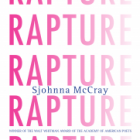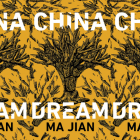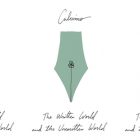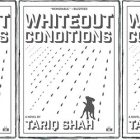Obit by Victoria Chang
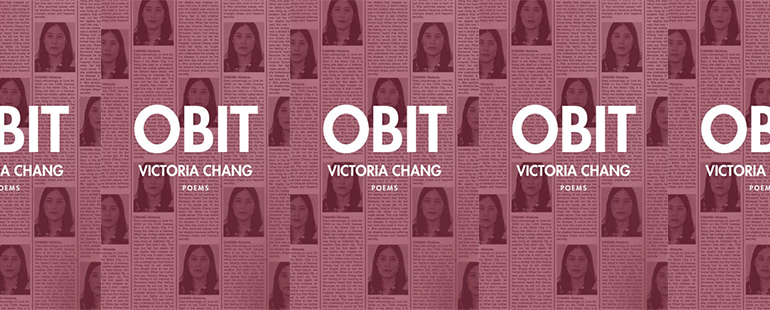
Obit
Victoria Chang
Copper Canyon Press | April 7, 2020
The elegy is a poetic form with so ancient a tradition, so many dauntingly famous examples, and so large an accumulation of expectations that Victoria Chang’s reluctance to resort to it is understandable, despite its seeming fitness for her circumstances. Her father suffered a debilitating stroke in 2009, and her mother, after a long engagement with pulmonary fibrosis, died in 2015, involving Chang in a cascade of endings: of language, logic, optimism, ambition, and secrets, to name a few of the losses recorded in this volume. She chose to record them, though, not in the august and ceremonial form of the elegy, but in the homelier confines of the obituary—the obit, in the abbreviation journalists use—short prose poems the width of a newspaper column, headed with a name and a date.
Chang’s obits, though, come as if from a parallel universe of obituaries, with different rules about what obits can say and how they can say it. Newspaper obits tend to linearity and coherence, for instance, hoping to convince us that our lives make a nice, consistent package; Chang’s are as quicksilver as memory in their leaps and landings:
The doorbell vanished. The trains stopped moving. Someone stole the North Pole sign. I am you, and you, and you. But there are so many obstacles between us. I can never feel my mother’s illness or my father’s dementia.
Chang’s honest acknowledgement of her limits, of what she “can never feel,” marks another departure. Newspaper obits are not famous for their candor; they observe the decorum of de mortuis nil nisi bonum and express none but socially appropriate feelings. One of Chang’s obits, however, admits that immediately after her father’s stroke, when her mother wanted her to come see them as soon as possible, she “had the feeling of not wanting to,” and another that a conversation with an uncle at her mother’s funeral revealed that “others found my mother difficult too.” These obits are fearless.
They are also specific and intimate. Ordinary obits traffic in the most public of facts, such as where one was born and where one worked, and the safest of generalities, such as one’s love of the outdoors or commitment to one’s community. Ordinary obits are not about the blue dress with its “millions of little blue flowers,” the other clothes “stuffed […] into lawn bags,” the “Favorite Potted Tree” with “the pink blossoms gone, the branches shabby opium pipes,” or the “Sheets off the bed in the corner like crushed birds.” For that matter, figurative language, such as the simile of the crushed birds, is out of order in the standard obit. Chang’s obits, however, swoop into metaphor frequently, with startling power, and the metaphors can metamorphose instantly:
Because after a death, there is no moving on despite the people waving us through the broken lights. There is only a stone key that fits into one stone lock. But the dead are holding the key. And the stone is a boulder in the stream. I wave my memories in, beat them with a wooden spoon, just for a moment, to stop the senselessness of time, just for a moment to feel the tinsel of death again, its dirty bloody beak.
Readers who sometimes pick up the reviews and quarterlies will have encountered some of these poems already (two appeared in Ploughshares), so I should mention what they gain by being together. For one thing, the dates acquire new significance—not that the poems are in chronological sequence, but readers can notice recurrences and patterns, the clusters of poems around certain dates, intuit a kind of narrative. Reading the poems together also makes some themes more apparent, such as the liminal zone between the expressible and the inexpressible, between the phenomenon and its representation, between language and silence: “When language leaves, all you have left is tone, all you have left are smoke signals. I didn’t know she was using her own body as wood.”
Crucial as well are the volume’s non-obit poems: a series of tanka, interspersed throughout the book and addressed to Chang’s children, and “I Am a Miner. The Light Burns Blue,” a longer poem, situated right at the book’s center, that takes its title from the opening line of Plath’s “Nick and the Candlestick.” Not particularly Plath-like in form, “I Am a Miner…” does evoke Plath’s atmosphere, that sense of being intimately engaged in domestic activity while also being very far away. The poem’s conjunction of the imagery of bees and beehives with that of “mothers with strollers” reminds us that childrearing is an ancient, collective activity undertaken mainly by women, as is, we may also recall, caring for the dying and preparing the dead. Occurring as it does in a volume filled with poems about Chang’s parents and poems addressed to her children, “I Am a Miner…” gives the book a surprising but subtle center.
That center is family and the inescapable gravity of family, with its history punctuated by marriages, births, and deaths, a history bearing everywhere traces of the stress of change: loss, renewal, and transformation. A family has a public side and a private one. The obituaries in our daily newspaper are mainly about the public one, about how we hope the rest of the community will see us. The emotional power of Chang’s Obits comes from the grace and honesty with which she turns this familiar form inside out to show us the private side of family, the knotting together of generations, the bewilderment of grief.
